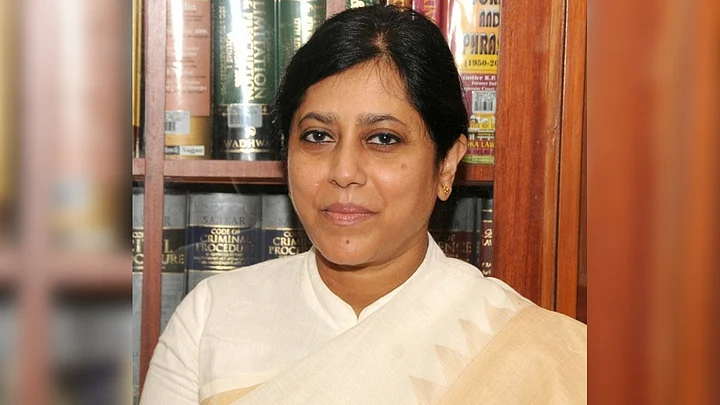Justice Revati Mohite Dere, the Bombay High Court judge controversially shifted from hearing the Sohrabuddin case, is at the centre of a storm.
The Bombay Lawyers’ Association has criticised Justice Dere’s reassignment in a letter to the Chief Justice of the Bombay HC, saying “This (the reassignment) is particularly intriguing considering how Justice Dere had consistently reprimanded the CBI’s approach in the case.”
And a war of words has begun between the BJP and the Congress on the matter as well.
But who is Justice Revati Dere? Here’s a look at the 42-year-old Bombay High Court judge at the heart of the controversy.
Dere hails from Pune and is an alumnus of Symbiosis Law College. After completing her studies, she joined the chambers of her father, Senior Advocate Vijayrao A Mohite. From there, she went on to practice in the Bombay High Court and was later appointed as a Government Pleader and Public Prosecutor for the State of Maharashtra.
In June 2013, Dere became an Additional Judge in the court she had practiced in for years. And in March 2016, she was elevated as a judge of the Bombay High Court.
The following are some of the notable orders and remarks in court by Justice Dere over her past five years as a judge.
Lifting Ban on Women’s Entry Into Inner Sanctum of Haji Ali Dargah
On 26 August 2016, a Division Bench comprising Justices VM Kanade and Revati Mohite Dere held that the ban on entry of women into the inner sanctum of the Haji Ali Dargah in Mumbai is violative of Articles 14, 15 and 21 of the Constitution.
The judgment, authored by Justice Dere, asserted:
The Haji Ali Dargah Trust has no right to discriminate entry of women into a public place of worship under the guise of ‘managing the affairs of religion’.
The ban had been imposed by the Haji Ali Dargah Trust in 2012.
The court also refused to accept the reasoning of the trust that the ban had been implemented for the safety and security of women, and to prevent them from being sexually harassed!
Holding that Islam does not condone such an embargo, the bench observed:
There is nothing in any of the aforesaid verses which shows that Islam does not permit entry of women at all, into a dargah/mosque and that their entry was sinful in Islam.
The dargah trust did move the Supreme Court against the order, but after a nudge by the apex court, the trust finally agreed to allow entry of women into the sanctum sanctorum of the dargah.
Refusing Bail to a 19-Yr-Old Accused of Sexually Assaulting a Minor Boy
In September 2017, Justice Dere rejected the bail application filed by a 19-year-old youth accused of sexually assaulting a 10-year-old boy.
The boy had said that the accused had called him to his residence and asked him to play games on his mobile. Later, he was taken to the kitchen and allegedly sexually assaulted.
Justice Dere rejected the bail application considering the nature of the crime and observed that since the victim was only 10 years old, the trial must be expedited and preferably concluded within a year.
She observed, “Prima facie, the statement of the victim boy and his mother clearly shows the complicity of the applicant. There is nothing on record to show, that the applicant has been falsely implicated in the case. The FIR was also lodged promptly. Considering the aforesaid, this is not a fit case to enlarge the applicant on bail.”
Suggesting That Corporates Pay Hospital Bills of the Poor as CSR
In January 2016, a Division Bench of the Bombay High Court, comprising Justice VM Kanade and Justice Dere, suggested that corporate companies can allot funds towards Corporate Social Responsibility (CSR), by setting aside 2 percent of their profits for paying hospital bills of patients who cannot afford to pay them.
The court said, “This will serve a dual purpose. The patient and his or her family is helped out and the hospital also gets its fees.”
Asserting That Courts Can Try a Person Not Booked by the Cops
In February 2014, Justice Dere ruled that a trial court can use powers under the Criminal Procedure Code (CrPC) to initiate criminal proceedings against a person who may not have been booked by the police in a case.
She stated that even if a person was not named as an accused in the chargesheet by the cops, a court can launch prosecution against him at any stage of the trial.
It is well settled, that once a Magistrate takes cognisance of an offence, he can proceed against those offenders also who have not been sent up by the police and that absence of chargesheet is not a bar.Justice Revati Dere
The court's order had come as a relief to Mumbai resident Mani Narayan in a 17-year-old case of assault and outraging her modesty.
She however cautioned that the power had to be used with due restraint.
The court has to use the said power sparingly and primarily to advance the cause of criminal justice and not as a tool at the hands of the court to cause harassment to persons who are not involved in the commission of the crime.
(Hey there, lady! What makes you laugh? Do you laugh at sexism, patriarchy, and misogyny? Do 'sanskaari' stereotypes crack you up? This Women's Day, join The Quint's Ab Laugh Naari campaign. Pick up that beer, say cheers, and send us photographs or videos of you laughing out loud at buriladki@thequint.com.)
(At The Quint, we question everything. Play an active role in shaping our journalism by becoming a member today.)
